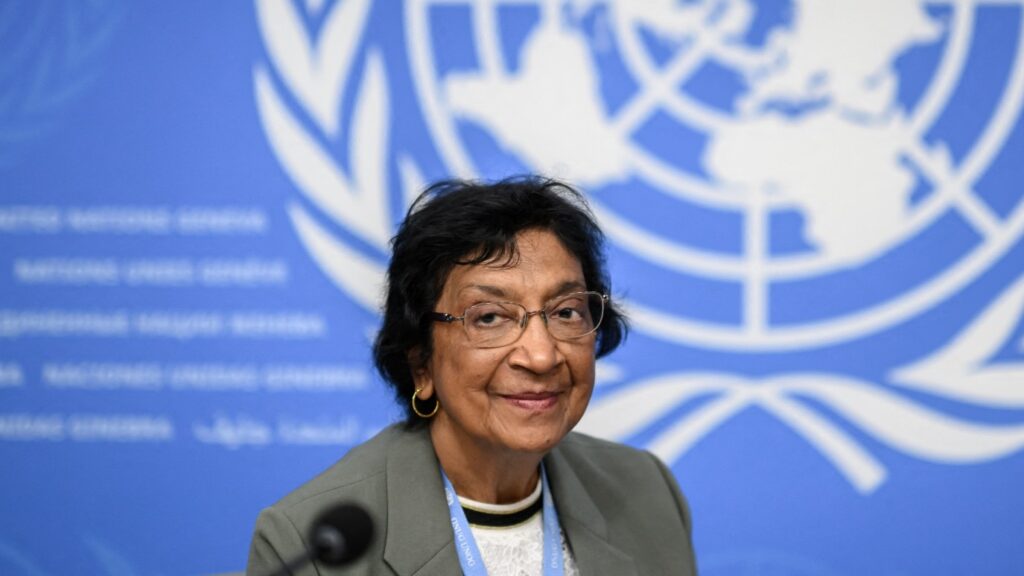The resignation of the United Nation’s commission of inquiry on Palestine is unrelated to fears of sanctions by the US government or any other external pressures, panel members have told Middle East Eye.
The commissioners’ accounts stand in stark contrast to reports this week that linked sanctions brought by the administration of US President Donald Trump against UN expert Francesca Albanese with their back-to-back resignations.
They also come as Israel, which has regularly criticised the commission’s findings, called on Friday for the body to be scrapped entirely, accusing it of bias.
But commissioners have told MEE that their decisions were made internally, before the sanctions were put on Albanese.
“The resignations are not linked in any way to anything outside whatsoever,” Chris Sidoti, an Australian international law expert and commission member who resigned, told MEE.
New MEE newsletter: Jerusalem Dispatch
Sign up to get the latest insights and analysis on
Israel-Palestine, alongside Turkey Unpacked and other MEE newsletters
The three-member commission was established in May 2021 by the Geneva-based UN Human Rights Council (HRC) with a permanent mandate to investigate international humanitarian and human rights law violations in occupied Palestine and Israel since April 2021.
Earlier this month, the three commissioners submitted their resignations, set to take effect in November, with the completion of the commission’s programme for 2025. It was the first time since the establishment of the HRC in 2006 that all members of a UN commission have jointly resigned.
On 8 July, the chair of the commission, South African jurist Navi Pillay, submitted her resignation citing personal reasons, a day before the Trump administration sanctioned Francesca Albanese, the UN’s special rapporteur on Palestine. The timing prompted some media outlets to link the two events.
“I regret to advise that owing to age, medical issues, and the weight of several other commitments, I feel compelled to retire as a member of the Commission,” the 83-year-old said in a letter seen by MEE.
‘The resignations are not linked in any way to anything outside whatsoever’
– Chris Sidoti, Australian jurist
A day later, Sidoti filed his resignation. “The retirement of the chair is an appropriate time to re-constitute the commission,” he wrote in a 9 July letter.
“I submit my resignation to facilitate that re-constitution and to enable you to strike the appropriate balance of expertise, region and gender among the commission’s members.”
Sidoti’s letter also said he was open to accepting re-appointment.
Speaking to MEE following his resignation, Sidoti reiterated the same rationale.
“For me, the reason is exactly what I said in my letter, that, when the chair retires and needs to be replaced, it is appropriate to look at the composition of the whole commission and, in resigning, I was enabling the president of the Human Rights Council to do that,” he told MEE.
On 10 July, the third member, Miloon Kothari, a renowned Indian human rights and social policy expert, filed his resignation. In it, he referred to an “understanding” reached during a meeting the previous week to resign simultaneously with other team members.
Kothari confirmed to MEE that the resignations were a collective decision, taken days before the sanctions on Albanese were announced.
“Our resignations, therefore, were not in any manner related to the sanctions,” he said.
‘Strictly internal matter’
The commission is mandated to report to the HRC and the UN General Assembly annually. Its members are independent experts, unpaid by the UN, on an open-ended mandate.
The commission’s reports are highly authoritative and are widely cited by international legal bodies, including the International Court of Justice and International Criminal Court in The Hague.
Over the past four years, it has produced some of the most groundbreaking reports on international law breaches in Israel and occupied Palestine.

UN urged to take legal action at ICJ to uphold Francesca Albanese’s immunity
Read More »
“The resignations are strictly an internal matter and have absolutely nothing to do with any external event or pressure,” Todd Pitman, media adviser for the HRC’s investigative bodies, told MEE.
Pitman said that Israel has obstructed the commission’s work by denying it entry into occupied Palestine and Israel, and that the commission has also faced hardships due to the financial crisis. Yet, the experts have not been under any pressure to resign.
“The commissioners fully stand by the findings of their reports and the work of the commission,” he said.
Pitman explained that the HRC’s president will call on member states to put forward bew commission candidates soon, with an aim to make appointments on or around 3 November when the resignations of Pillay and Sidoti take effect.
Pillay served as UN High Commissioner for Human Rights from 2008 to 2014. She previously served as a judge in the International Court of Justice in The Hague and presided over the UN’s ad hoc tribunal for Rwanda.
Kothari served as the first UN Special Rapporteur on adequate housing (2000-2008) while Sidoti is a human rights law expert and previously served as a member of the UN Independent International Fact Finding Mission on Myanmar (2017-2019).

